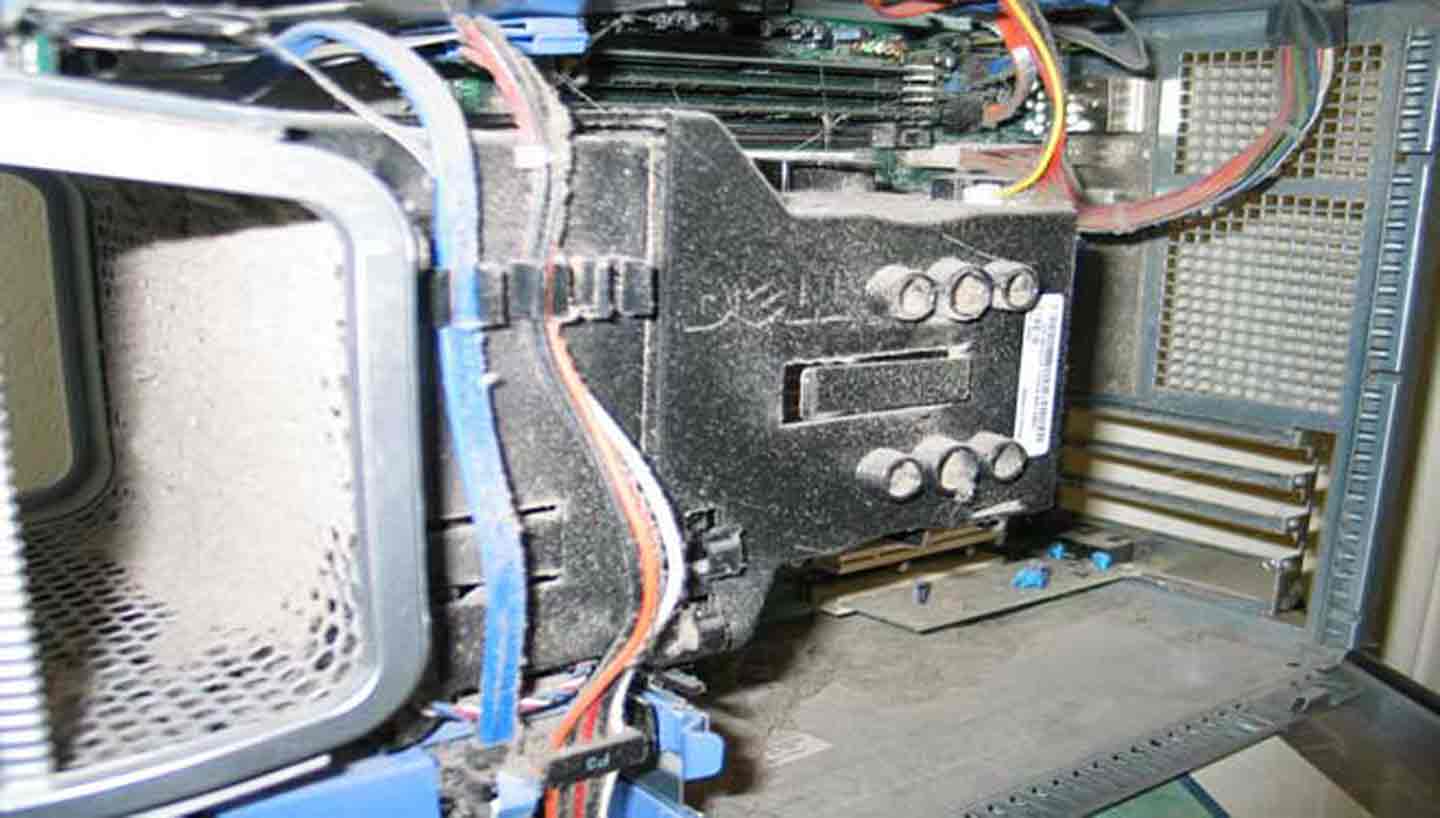Effects of dust and dirt
Components covered in dust run much hotter than they were designed to, possibly causing the computer's central processing unit (CPU) to throttle performance. Throttling is a method used to prevent the CPU from overheating. The computer's performance drops significantly for no apparent reason. The computer becomes slow and unresponsive, similar to virus or malware activity. Some CPUs don't utilize throttling, and the computer will shut off, or Windows crashes, displaying a blue screen once the CPU begins to overheat. If the central processing unit does not protect itself, it could damage the CPU. The damage caused by an overheating PC could lead to many problems and symptoms, making it harder to determine the source, thus driving up the cost to repair a potentially damaged computer.

Please don't wait until it is a dirty mess to clean it
Dirty fans are loud
Computers with filthy fans are louder than usual because the fans have to run at higher speeds to cool the components. If your computer has gotten louder over time, it is not because it is getting older. It is most likely due to dust and dirt build-up. If a PC is throttling or crashing, it needs looking at. It is easy to open the case and take a look inside with desktops. Laptops are a bit harder and may require disassembly to clean thoroughly. Either way, ignoring the warning signs can lead to a complete system failure. A quick look inside can mean the difference between simply cleaning the PC, possibly having to buy new parts, or even buying a new computer.
Like a car overheating, a PC will fire up and run again once it has had time to cool. However, once you turn it back on, the cycle starts again. Doing this over and over could potentially ruin the computer causing damage due to excessive heat. Not only potentially damaging the device but gradually corrupting the file system, which may warrant reloading the operating system to repair the damage.
Fans and heatsinks
Fans are the primary cooling system in most computers. They bring cool air into the case and push warm air out. They also blow air directly onto heatsinks which cool components like the central processing unit (CPU). Heatsinks are finned metal blocks that dissipate the heat generated by the chip they are seated to. The fins allow air to flow through them, transferring the heat into the case. A case fan then blows out this heat. If any of these fans fail, the system can become much hotter than designed. A computer with failed fans may work all winter long and then fail badly during the summer months.

Don't ignore the inside of your computer case
A plugged heatsink is worthless for cooling. It will get hotter and hotter with the component it is trying to cool. A sign of this happening is that the computer becomes louder as the fan has to spin faster to perform regular duties. Don't ignore a louder than usual computer.
Sometimes fans go quiet as well. If your computer is suddenly silent, that would be an excellent time to take a look inside. The video card below went with a bang.

Overheating components can become a fire hazard
This video card went with a loud bang, described as a firecracker. However, the end-user needed the computer and kept using it until it froze or crashed. Repeating the process over and over again. The video card got hot enough to change the board's color from red to brown in spots, and by using it, the end-user risked fire and possibly ruined the computer.
Removing the dust
Fans can get so clogged with dust that they can be rendered ineffective. Fans are constantly forcing dust onto the heatsinks eventually; this build-up can stop the fan from spinning at all. It is vital to open your computer case and dust the inside once every six months for dusty environments, once a year for average amounts of dust. People who have indoor pets or smokers need to clean their PC more often.
Compressed air cans
When using compressed air cans, be sure to keep the can upright to prevent spraying liquefied gas onto your computer's components. Cans of compressed air are not environmentally friendly and can be dangerous due to the very cold gases. Blowing directly against the skin at close range can burn very quickly. PCMD recommends a small blower instead of compressed air cans.
Do not try and dust the inside of CDs and DVD players. Do not blow air directly into an open or closed DVD, CD-ROM, or Blu-ray drive to prevent fouling the laser with dust.

This Dell design was an air flow failure
Before you begin cleaning your PC, PCMD wants you to know If you choose to use anything to dust your computer, PCMD takes no responsibility if things go wrong. The tips outlined are for information purposes only and do not state that anyone can or should dust their PC.
Before dusting the inside of your PC, unplug the power cord and all peripherals. Never touch any internal components without adequately grounding yourself. One way to do this is to contact a metal part of the case with your bare hand before you begin. The best way to be sure you are grounded is to use a grounding strap and mat. Do not proceed with dusting your computer if you are not comfortable with doing mechanical things yourself or you in any way question what you are doing.
Computers need cleaning regularly, and if you have more than one, it can take quite a few cans of compressed air to clean them effectively. Consider buying a blower made explicitly for computers. I would not recommend an air compressor unless you have a properly maintained water trap and a working pressure regulator. As always, use caution and proper settings.


